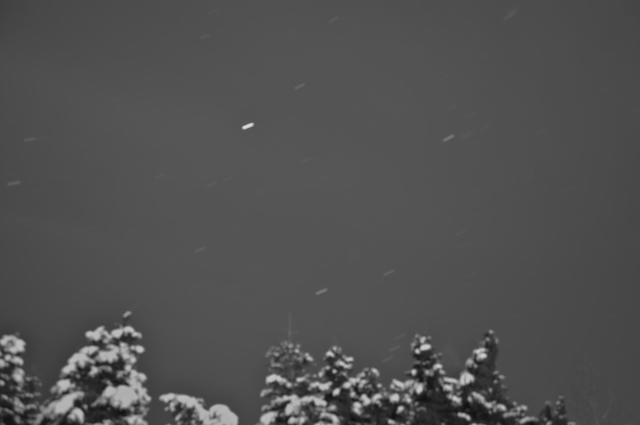January 05, 2008
Night Photography In The Cold Is Tough

I have had some rough experiences with night photography thus far, mostly because keeping the shutter open in cold weather kills the camera battery. Before the Death Valley camping trip I got a remote switch that could keep the shutter open for pretty much as long as I wanted. I did some test shots at home in San Jose and I was pretty confident going to Death Valley that I was going to get the kind of star trail shots that I wanted. For the most part the shots came out as I wanted with distinct trails being shown, and I experimented with the exposure, iso, and f-stop using a 50 mm fixed lens. The thing that I didn't consider and which burned me was the battery for my camera (lithium ion) got absolutely hammered by cold weather. The night shots in Death Valley were done at a temperature of about 30 degrees F. The last, and best shot that I took was one centered on the North Star to get the star trails of the stars spinning around it. I set the exposure to 3 hours and went to sleep (right next to the tripod). When I woke up part of the way through the night to check on it the camera was off and the battery was pretty much dead. I could not do much right then because the battery was pretty much dead and the LCD was not working. The next day I checked out the shots and the north star shot looked a little weird on my LCD and the battery was just barely alive. My biggest mistakes (which I will not make again) were:
1. I didn't bring extra batteries
2. I didn't bring a charger.
So for the rest of the Death Valley trip I ended up using my iPhone to take pictures. When I was in Alaska for Christmas I didn't get many opportunities to take night shots because Anchorage was clouded over most of the time. It finally cleared up a little bit on the last night and I decided that I had to go take my shots. I took what I learned from the Death Valley trip and applied it, but this time, in 15 degrees F my battery nearly died with only a 15 minute exposure. I discussed this problem with one of my coworkers that is pretty knowledgeable with cameras and the consensus we came up with was:
1. You should always have extra batteries f
2. You should try to find some way to keep your battery warm while it is in the camera taking the long exposure shots in cold weather.
He also recommended not doing long exposures in cold weather, but in my experience some of the best night shots are done
Posted by troutm8 at January 5, 2008 04:41 PM